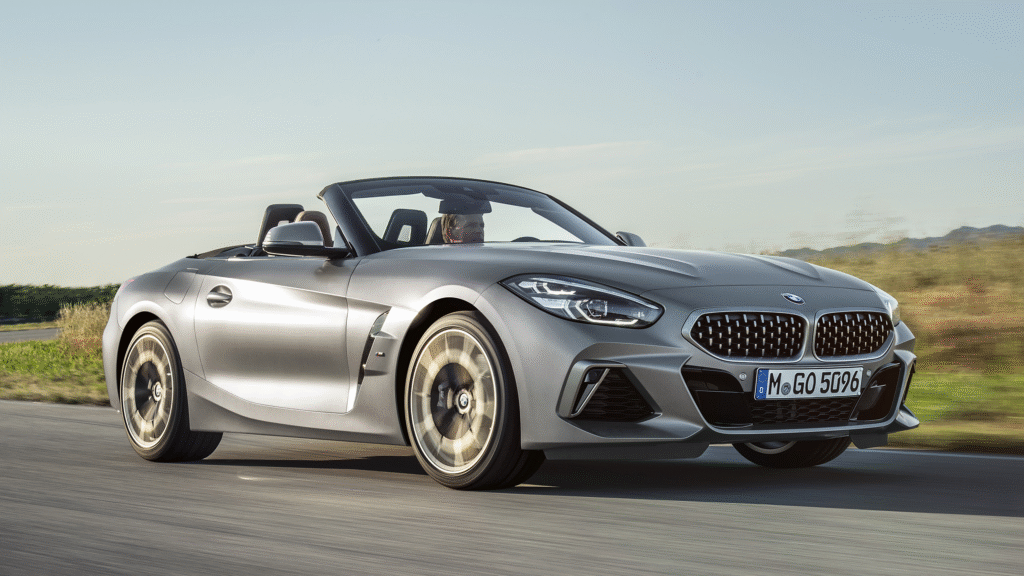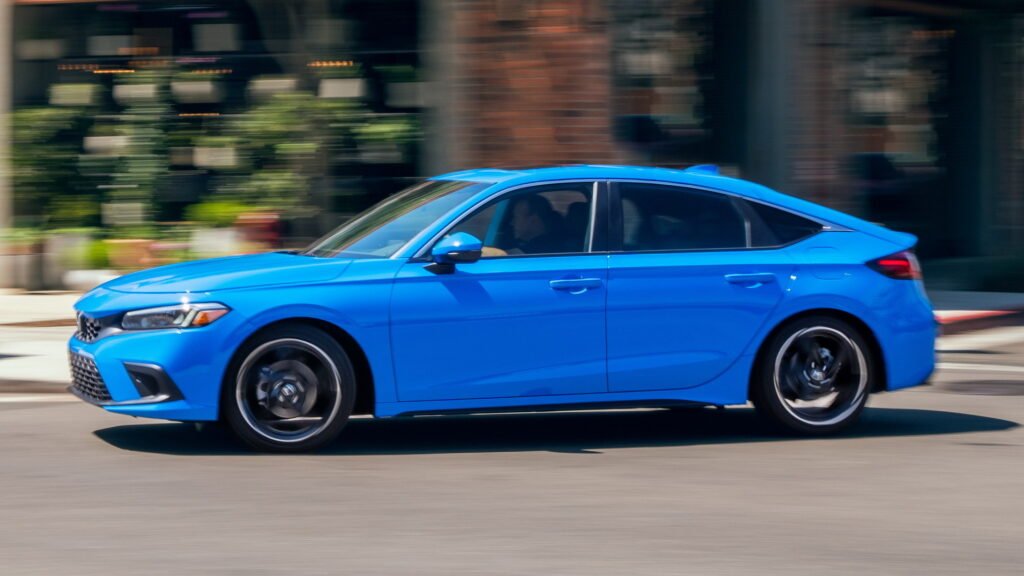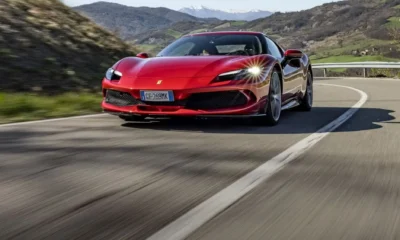Automobiles
BMW recalls nearly 200,000 cars over fire risk… NHTSA warns owners to park outside
The recall covers popular BMW models, including the Z4, 330i, X3, and even Toyota Supra, due to a fire hazard linked to corroded engine starter relays.

Luxury automaker BMW has issued a sweeping recall for nearly 200,000 vehicles in the United States after regulators flagged a fire risk tied to engine starter defects.
According to the National Highway Traffic Safety Administration (NHTSA), the recall involves 196,355 BMW vehicles manufactured between 2019 and 2022. Additionally, about 1,469 Toyota Supra cars—also produced by BMW—are part of the recall.
The issue stems from the engine starter relay, which can corrode over time, causing it to overheat and potentially short-circuit. What makes the situation more serious is that the defect can trigger a fire both when the car is parked and when it is in motion.
“Owners are advised to park their vehicles outside and away from structures until the remedy is complete,” NHTSA said in its fire-risk warning.

Which BMW models are affected?
The recall covers several popular models, including:
- 2019–2022 BMW Z4
- 2019–2021 BMW 330i
- 2020–2022 BMW X3
- 2020–2022 BMW X4
- 2020–2022 BMW 530i
- 2021–2022 BMW 430i (standard and convertible)
- 2022 BMW 230i
- 2020–2022 Toyota Supra
Owners will be able to confirm whether their specific vehicle is affected by entering their VIN or license plate number on the NHTSA website beginning November 14.
BMW’s response and next steps
BMW dealers will replace the faulty starter free of charge, but the recall will be rolled out in phases due to limited availability of replacement parts.
- Interim letters will be mailed to owners on November 14.
- A second letter will follow once parts are available.
BMW owners can also call the company directly at 1-800-525-7417 for recall-related assistance.

Not the first fire controversy for BMW
This isn’t the first time the German luxury brand has faced scrutiny over fire risks. Back in 2018, the South Korean government fined BMW $10 million after nearly 50 of its cars caught fire in a single year. An investigation later revealed that BMW had delayed recalling 172,000 vehicles and allegedly attempted to conceal the severity of the problem.
While no injuries have been reported in the current recall, safety officials stress that owners should not ignore the warnings. With the stakes this high, BMW is under renewed pressure to demonstrate transparency and restore customer confidence.
For more Update http://www.dailyglobaldiary.com
Automobiles
Honda Recalls 406,000 Civics in the U.S. — Wheels Could Fall Off While Driving, Warns Automaker
Honda urges owners of 2016–2021 Civics to visit dealerships immediately after reports revealed a supplier defect that could cause wheels to detach mid-drive — though no injuries have been confirmed yet.

It’s not every day that a recall affects one of America’s best-selling cars, but this one has car owners on alert. Honda Motor Company has announced a massive recall of 406,000 Civic sedans and hatchbacks from model years 2016 through 2021, citing a potential issue with an accessory 18-inch aluminum alloy wheel that could loosen or detach while the vehicle is in motion.
According to American Honda’s official statement, the issue traces back to a manufacturing defect from a third-party supplier, which may have caused the wheel’s lug nut seating surface to deform. This flaw, though present in a limited number of vehicles, could lead to the nuts coming loose over time — potentially causing the wheel to separate entirely.
“Even though only a small number of vehicles are equipped with the affected accessory wheels, we are taking this matter seriously,” said a Honda spokesperson in a statement shared with Reuters.
While approximately 3276 Civics are confirmed to have the defective wheels installed, the recall extends to all vehicles that could potentially carry them. Honda has clarified that no accidents or injuries have been reported so far, but emphasized that affected owners should avoid delay in inspection and replacement.

What Honda Owners Need to Know
- Models Affected: Civic Sedan and Civic Hatchback (2016–2021)
- Component at Risk: 18-inch accessory aluminum alloy wheel
- Cause: Supplier manufacturing defect leading to deformation of lug nut seating surface
- Risk: Wheel separation due to loosening nuts
- Action: Honda will inspect and replace affected wheels free of cost
Owners are advised to contact their nearest Honda dealership or check their vehicle’s recall status on the company’s official recalls.honda.com website.
Honda’s Track Record and Safety Commitment
The recall comes at a time when automakers across the globe are under pressure to enhance manufacturing quality and safety oversight. Honda, known for its consistent performance in the U.S. safety rankings, has faced similar large-scale recalls in the past — most notably the Takata airbag crisis, which affected millions of vehicles worldwide.
However, analysts believe the company’s proactive recall strategy helps prevent potential accidents before they occur. Automotive expert John Nielsen of the American Automobile Association (AAA) noted,
“Recalls like these may sound alarming, but they often reflect a manufacturer’s willingness to act early rather than after tragedy strikes.”

How to Check If Your Car Is Affected
Drivers can identify if their Civic is part of the recall by entering their Vehicle Identification Number (VIN) on Honda’s website or by calling the company’s toll-free customer service line. Dealerships will inspect and replace the wheels free of charge under this campaign.
The Bigger Picture
The recall underscores growing concerns in the auto industry about outsourced component reliability. As companies rely more heavily on third-party manufacturers, even a minor production defect can snowball into a global recall.
For now, Honda owners can rest assured — the company is addressing the issue promptly and thoroughly. But experts advise regular vehicle maintenance checks, especially before long drives, as wheel security issues can escalate quickly if ignored.
For more Update http://www.dailyglobaldiary.com
Business
Tesla’s record sales boost Elon Musk past $500 billion… but will the momentum last?
A record-breaking third quarter lifted Tesla’s sales and briefly made Elon Musk the world’s first half-trillionaire, but growing competition and policy changes raise tough questions ahead.

For Tesla and its high-profile CEO Elon Musk, the third quarter of 2025 delivered both a record and a warning. The electric vehicle giant sold 497,099 cars worldwide from July through September, the highest quarterly tally in its history. That surge briefly pushed Musk’s fortune above $500 billion, according to Forbes’ billionaire tracker, making him the first person to ever cross that threshold.
But just as quickly as Tesla stock spiked, the gains began to slip. By Thursday afternoon, Tesla’s shares had dropped nearly 4%, pulling Musk’s net worth back down to $490 billion.
The tax credit rush
The record quarter was driven by a last-minute rush from American buyers before a $7,500 federal EV tax credit expired on September 30. The incentive, introduced under the Biden administration in 2022, was eliminated as part of Donald Trump’s sweeping spending and tax bill earlier this year.
That policy change sparked a short-term boom — but experts warn it could lead to a slump in coming months. Despite the blockbuster quarter, Tesla’s overall year-to-date sales remain 6% lower compared to 2024.

Rivals close in
Tesla wasn’t the only automaker enjoying the tax-credit frenzy. General Motors more than doubled its US EV sales in the same quarter, while Ford reported a 30% jump. Hyundai also doubled its US EV sales, even as it cut prices on its IONIQ 5 by more than $9,000 to stay competitive.
And outside America, Tesla’s biggest threat may come from BYD. The Chinese automaker reported a 31% year-over-year surge in sales, bringing its total EV passenger cars sold in 2025 to 1.6 million, compared to Tesla’s 1.2 million. Despite not selling in the US, BYD is now on track to overtake Tesla as the world’s largest EV maker.
Market share pressures
Tesla’s dominance is no longer assured. Registration data shows the company continues to lose global market share to rivals. While loyal fans still associate Tesla with innovation, some buyers have been turned off by Musk’s outspoken political activity, which has triggered protests in both the US and Europe.
Meanwhile, Chinese automakers like BYD are capturing more of the European EV market, eroding Tesla’s stronghold. And with automakers such as GM, Ford, and Hyundai slashing prices, Tesla faces the pressure of a rapidly commoditizing EV industry.

What’s next?
The third quarter record may end up being a fleeting high point. Analysts say Tesla’s next big challenge will be proving it can sustain growth without the tailwind of government subsidies and while fighting intensifying competition across every major market.
For more Update http://www.dailyglobaldiary.com
Business
UK drivers brace for major tax shake-up as weight-based charges could hit petrol, diesel and EVs alike…
A leading think tank proposes replacing emissions-based road tax with a pay-per-mile system tied to vehicle weight—potentially raising costs for heavy SUVs and electric cars.

British drivers may soon face a radical shift in road taxation, with proposals suggesting that car owners will be charged based on vehicle weight rather than emissions. The plan, set out by the influential Resolution Foundation, could affect millions of motorists—whether they drive petrol, diesel, or electric cars.
Why change the system?
Currently, the UK’s Vehicle Excise Duty (VED) is largely calculated on tailpipe emissions. This means electric vehicles (EVs), which produce zero CO₂ on the road, have often avoided paying road tax altogether. But as EV adoption accelerates, the Treasury is losing billions in revenue once generated from combustion cars.
With EVs projected to dominate new sales in the next decade, policymakers are under pressure to find a sustainable replacement.
The weight-based proposal
The Resolution Foundation suggests a “pay-per-mile” system that scales with a car’s weight. Under the model:

A lightweight EV weighing 1,000kg would pay about 3p per mile.- A mid-sized EV weighing 1,800kg would pay 6p per mile.
- A large SUV or heavy EV above 2,800kg could face up to 9p per mile.
The idea is to link road charges directly to the impact cars have on infrastructure and the environment—heavier vehicles cause more road wear, produce greater tyre and brake pollution, and pose higher risks to pedestrians.
Not just EVs
Importantly, the proposed system would not single out EVs. Traditional petrol and diesel vehicles could also see their flat £195 VED replaced with weight-tiered charges, making it a universal system for all drivers.
Global precedents
Weight-based taxation is not a new idea. Countries like the Netherlands, Estonia, and even New South Wales, Australia, already have similar frameworks in place. Advocates say these systems have improved fairness while discouraging oversized cars.
Government response
The UK Treasury has already signaled its intent to reform motoring taxes, introducing VED for EVs in 2025 and investing over £2 billion to boost greener transport. A spokesperson said policymakers are balancing the need for revenue with incentives for low-emission travel.
Industry experts believe the changes could reshape car-buying behavior. Families may think twice before purchasing bulky SUVs, while manufacturers could feel pressure to design lighter, more efficient EVs.

A fundamental shift
For drivers, the impact could be significant. Someone covering 10,000 miles annually in a heavy EV could face £900 in extra charges. For large SUV owners, this could be even higher.
Critics argue the timing is delicate—just as the UK is trying to encourage EV adoption, heavier taxes may discourage buyers. Supporters counter that fairness and sustainability should guide future policy.
Either way, the shift from emissions-based to weight-based taxation would mark one of the most dramatic changes in UK road policy in decades—and every driver will feel it.
For more Update http://www.dailyglobaldiary.com
-

 US News1 week ago
US News1 week ago“She Never Made It Out…” Albany House Fire Claims Woman’s Life as Family Pleads for Help to Bring Her Home
-

 Entertainment1 week ago
Entertainment1 week agoXG Star Cocona Shares a Brave Truth at 20 — “I Was Born Female, But That Label Never Represented Who I Truly Am…”
-

 Entertainment1 week ago
Entertainment1 week agoSamba Schutte Reveals the Surprise Cameo in Pluribus That “Nobody Saw Coming”… and Why John Cena Was Perfect for the Role
-

 Entertainment5 days ago
Entertainment5 days agoSaudi Arabia’s entertainment revolution… Red Sea Film Foundation CEO Faisal Baltyuor says he ‘wears many hats’ — but one mission drives them all
-

 Entertainment5 days ago
Entertainment5 days ago“Nicholas Hoult breaks silence on childhood fears… ‘Everyone told me child actors disappear’ — what he revealed at Red Sea Festival
-

 Entertainment1 week ago
Entertainment1 week agoMandy Moore Signs On for a Bold New Peacock Erotic Thriller — “A Twisted Game Where the Student Becomes the Teacher…”
-

 Entertainment3 days ago
Entertainment3 days agoAmy Schumer and Chris Fischer Split After 7 Years of Marriage — Inside Their ‘Cohesive’ and Amicable Divorce
-

 Politics6 days ago
Politics6 days ago“If I Can’t Beat Jimmy Kimmel, I Shouldn’t Be President…” Trump Drops Bold Claim Ahead of Hosting Kennedy Center Honors




















